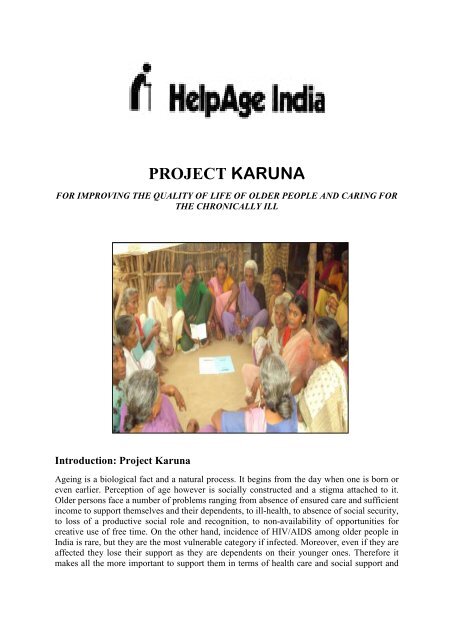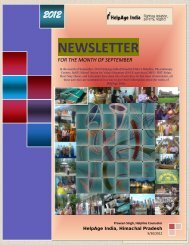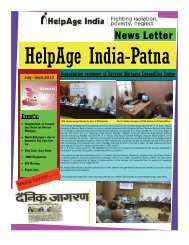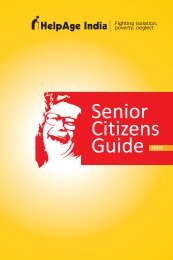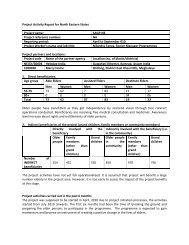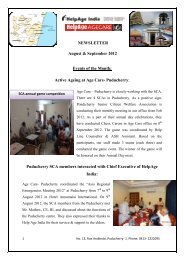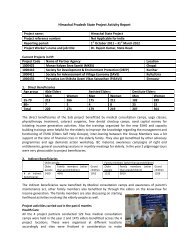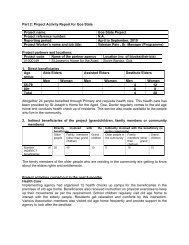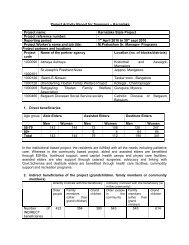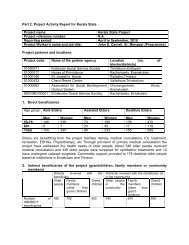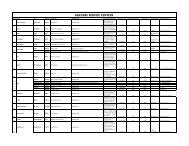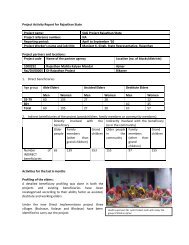PROJECT KARUNA - Helpage India Programme
PROJECT KARUNA - Helpage India Programme
PROJECT KARUNA - Helpage India Programme
Create successful ePaper yourself
Turn your PDF publications into a flip-book with our unique Google optimized e-Paper software.
<strong>PROJECT</strong> <strong>KARUNA</strong><br />
FOR IMPROVING THE QUALITY OF LIFE OF OLDER PEOPLE AND CARING FOR<br />
THE CHRONICALLY ILL<br />
Introduction: Project Karuna<br />
Ageing is a biological fact and a natural process. It begins from the day when one is born or<br />
even earlier. Perception of age however is socially constructed and a stigma attached to it.<br />
Older persons face a number of problems ranging from absence of ensured care and sufficient<br />
income to support themselves and their dependents, to ill-health, to absence of social security,<br />
to loss of a productive social role and recognition, to non-availability of opportunities for<br />
creative use of free time. On the other hand, incidence of HIV/AIDS among older people in<br />
<strong>India</strong> is rare, but they are the most vulnerable category if infected. Moreover, even if they are<br />
affected they lose their support as they are dependents on their younger ones. Therefore it<br />
makes all the more important to support them in terms of health care and social support and
to raise awareness on HIV/AIDS, TB and other chronic and contagious diseases so that they<br />
can take up the social responsibility to caution their younger generations.<br />
The Project<br />
Based on these perceived understanding HelpAge <strong>India</strong> in affiliation with Age UK launched<br />
Project Karuna - a three year pilot programme initiated in August 2008. This project is<br />
currently successfully progressing in 11 villages in 9 Gram Panchayats in Korukonda Mandal<br />
of East Godavari District 1 of Andhra Pradesh. The villages chosen under the project are<br />
Raghavapuram, Kanupur, Rajavaram, Bulledullapalem, Gargalapalem, Munagala, Gadala,<br />
Burugupudi, Nidigatla, Buchempeta, and Jagannadhapuram.<br />
Goal<br />
• To reduce the burden of ageing and improve the quality of life of the aged,<br />
chronically ill including those infected/affected by HIV/AIDS, on a sustainable basis.<br />
Objectives<br />
• To improve the quality of life of the elderly by providing health care services,<br />
promoting livelihood generating activities through community based organizations of<br />
the elders and protecting the rights of the elderly.<br />
• Facilitate involvement of older people in providing support to the chronically ill<br />
Particularly those who are infected/affected by HIV/AIDS, TB and other chronic<br />
and contagious diseases.<br />
• Raise awareness regarding HIV/AIDS, TB and other chronic and contagious diseases<br />
to the old and the young alike. So as to generate a sense of responsibility among the<br />
elderly and the importance of community participation in reducing the burden of<br />
those who are suffering from those diseases.<br />
Vision<br />
A system of comprehensive, replicable and sustainable care of the elderly, chronically ill<br />
including those infected/affected by HIV/AIDS in the 11 project villages, owned and<br />
managed by the elderly and other community through their organisations, in place and<br />
functioning (by 31 July 2011).<br />
Strategy<br />
To attain the above stated vision, Project <strong>KARUNA</strong> adopted a three pronged strategy which<br />
are as follows:<br />
• Health Care<br />
• Social Mobilization<br />
• Advocacy<br />
Expected Results:<br />
By adopting the above stated strategies the following results are expected by the end of the<br />
project period<br />
• A village-wise and family-wise Social, Health and Economic profiling of all elders,<br />
chronically ill including HIV/AIDS infected is done in the project villages
• Each village has at least two or more trained and actively engaged Health/Social<br />
Volunteers/Animators working for the target group (elders, chronically ill including<br />
HIV/AIDS infected)<br />
• A Referral System/Network is in place (at least to cater to the top 20 ailments of the<br />
target group)<br />
• The community is participating / and taking responsibility in rehabilitating the<br />
disadvantaged elderly people at large<br />
• Almost all (80% or more) active elders of the project area, are members in<br />
Elder Self-Help Groups (ESHGs)<br />
• Capacity Building exercises (trainings/workshops/exposure visits etc.) are taken up<br />
for all the ESHGs<br />
• All ESHGs are engaged in savings, internal lending, collective activities (collective<br />
purchases, livelihood activities etc.)<br />
• All ESHGs have bank accounts<br />
• All ESHGs are actively participating in advocacy – (pensions, Arogya Sri, 108 & 104<br />
services etc.)<br />
• ESHGs are federated into Village/Panchayat Level Federation (VLF/PLF) and/or<br />
Mandal Level Federation (MLF) as appropriate<br />
• Capacity building exercises are taken up for the elders Federation(s)<br />
• Elders Federation(s) are actively engaged and responding to the needs of the ESHG<br />
members<br />
• A system for destitute elder care and chronically ill is in place<br />
• At least 1 Health Camp and 1 Event is conducted in each village/cluster of villages<br />
per quarter
Progress made by Project <strong>KARUNA</strong> during August 2009-July 2010<br />
Project Team:<br />
As mentioned earlier there was a staff turnover throughout the year 2008-09, but by July<br />
2009 the entire project team was recruited and underwent rigorous induction programme. The<br />
roles and responsibilities of the project team are depicted in the following table:<br />
Designation<br />
In order to provide psychological, physical and social support to the elderly on one hand and<br />
on the other hand to mobilize the elder’s community to take part in the activities of the<br />
project, community volunteers have been selected from their respective villages. At present<br />
there are 26 CVs in 11 villages who are actively involved in the activities of the project.<br />
During this period all the volunteers with the help of project staff completed baseline data in<br />
11 villages and formed around 177 ESHGs by July 2010, followed by formation of 11<br />
Village Federations.<br />
General and SHE Profiling:<br />
In order to build rapport with the villagers and to know the exact number of old people in all<br />
11 villages a general profiling was done. Further, to know their socio economic and health<br />
status a survey was undertaken in all 11 villages by the staff of project with the help of<br />
community volunteers. So far by July 2010, a sum of 2,592 SHE profiles and 6,282 General<br />
profiles have been completed and computerised.<br />
Village-wise profile<br />
Responsibility<br />
Project Coordinator Overall project implementation & monitoring of the programs<br />
Medical consultant Detection of the disease & prescription of the medicines and<br />
visiting home care cases<br />
Communication in Social mobilization, documenting case studies, monitoring the<br />
charge/Social worker volunteers work. Submission of reports to PC for fine tuning.<br />
GNMs<br />
Assist the Doctor in MMU, MPU and Community volunteers and<br />
further, monitoring the ESHGs& VF activities<br />
Pharmacist<br />
Distribution of medicines to the elders who visit MMU&MPU<br />
Drivers<br />
Apart from driving MMU and MPU, they are extending their help<br />
by registering the elders at MMU and MPU at each village<br />
Village<br />
Total No. of No. of No. of No. of HIV Gen. SHE<br />
Population<br />
Houses Families Elderly cases Profiles Profiles<br />
Infec-<br />
ted<br />
Affected<br />
Done Done<br />
Nidigatla 1671 418 775 195 9 7 418 195<br />
Buchempeta 1699 489 849 290 8 3 489 290<br />
Burugupudi 1577 662 799 275 10 7 662 275<br />
Kanpur 3702 1036 1755 340 2 1 1036 340<br />
Munugala 1917 510 1019 230 6 9 510 230<br />
Rajavaram 861 237 412 118 3 7 237 118<br />
Bulleddulapalem 2537 540 1242 225 2 0 540 225<br />
Raghavapuram 1715 490 942 255 4 5 490 255<br />
Garagalapalem 735 195 362 102 1 5 195 102<br />
Gadala 1993 1112 1001 310 9 1 1112 310<br />
Jaganndahpuram 3787 593 1243 252 3 8 593 252<br />
Total 22194 6282 10399 2592 57 53 6282 2592
Health Care<br />
MMU Services<br />
In line with project goals and objectives and to support and strengthen the community level<br />
programmes, the project is currently emphasizing on medical care through the provision of<br />
Mobile Medicare Unit (MMU) services, which is also focuses on establishment of rapport<br />
and to secure confidence among the participant communities. The MMU services have been<br />
started in all the 11 selected villages and visited twice in a month. A total of 245 visits have<br />
been made by the MMU within a year (July-2009 to June2010). At an average 2 visits were<br />
made per each village in a month as per plan. Since then the project has successfully<br />
registered nearly 94% (of the estimated elderly population i.e. 2428 out of 2592) elders<br />
within a year. Most of the registered elders received Out Patient (OP) services. During this<br />
year around 100 diabetic cases, 423 hypertension cases, 50 Skin diseases and around 1950<br />
persons with Arthritis have been treated. Apart from that HIV infected and affected people<br />
also availed MMU services.<br />
Palliative care<br />
In order to provide complete health care to the chronically ill elderly patients’ palliative care<br />
was included. So far 17 home care cases have been attended by the medical consultant along<br />
with GNMs. These patients were given treatment and drugs. Further, the project staff also<br />
provided psycho social support, and counselled their family members so as to provide proper<br />
care to them and the follow up was done by the project GNMs.<br />
Referrals:<br />
Services<br />
No of people availed<br />
Diabetic 100<br />
Hypertension 423<br />
Skin diseases 50<br />
Arthritis 1950<br />
In course of MMU visits it was found that there are 176 aged who need medical attention<br />
beyond the scope of MMU. So the medical consultant accompanying MMU referred these<br />
cases to various hospitals. List of cases referred is represented in the following table:<br />
Referral centre Referrals Output<br />
male female<br />
GSL General 51 36 General Check Up<br />
GSL Ophthalmology 11 7 3 received Spectacles and I Cataract<br />
operated<br />
GSL ENT 1 0 General Treatment<br />
GSL Ortho 4 5 General Treatment<br />
ICTC 15 18 Under ARV treatment and weight has<br />
registered an increase.<br />
Gouthami eye hospital 2 3 Cataract operated<br />
PHC Korukonda 1 1 Received General Treatment<br />
Total 85 70
MPU Services<br />
During the course of MMU visits, it was found that majority of the cases registered were<br />
related to chronic arthritis. Therefore, Project <strong>KARUNA</strong> thought it’s necessary to provide<br />
Mobile Physiotherapy Unit (MPU) services, and formally started the same in March 2010.<br />
The MPU consists of a physiotherapist (medical intern) provided by GSLMC. GNMs and<br />
volunteers from the Project assist the Physiotherapist in organizing camps. The identified<br />
patients were checked by the Physiotherapist and accordingly they were given treatment by<br />
physiotherapist/ Physio-aids. As of now MPU made a sum of 68 visits and 1377 consultations<br />
provided in all 11 villages.<br />
Village<br />
Volunteers<br />
Total<br />
Elders<br />
Screened<br />
Elders Availed<br />
MPU<br />
M F<br />
Total consultations<br />
(Treatments)<br />
Gadala 2 11 13 24 120<br />
Burugupudi 2 2 2 4 24<br />
Nidigatla 2 13 3 16 144<br />
Butchempeta 3 4 17 21 147<br />
Jagannathapuram 2 15 3 18 108<br />
Ragavapuram 2 14 24 38 152<br />
Kanupur 2 7 8 15 15<br />
Rajavaram 2 5 7 12 12<br />
Bulledulapalem 3 19 5 24 240<br />
Garagallapalem 3 13 7 20 240<br />
Munagala 3 15 10 25 175<br />
Total 26 118 99 217 1377<br />
Health care related to HIV/AIDS Infected/affected:<br />
By July 2010, Project Karuna has identified 91 HIV infected people who were counseled by<br />
project staff to avail medicines from MMU. Out of these 91 people, five were elders, 42 were<br />
males, and 44 were female including four children. The project staff also counseled and<br />
convinced them to maintain health and hygiene and take nutritious food. A total of 156<br />
people were identified as HIV affected, among whom 56 were male, 74 were female and 26<br />
were children and these people were also counseled on health and hygiene practices. Further,<br />
these people are receiving medical attention by MMUs as well as by the ART centers.<br />
Social Mobilization<br />
With the intent to promote social awareness, cohesion and the concept of mutual support in<br />
times of distress, the project has facilitated the formation of Elders Self Help Groups in all<br />
the 11 villages of Korukonda Mandal. However, due to turn ups of the project staff in the first<br />
year of the project only 19 groups were formed. But now as the entire staff has been recruited<br />
and put in place things worked out faster. By the end of July 2010, 177 ESHGs were formed.<br />
In other words out of a total 2592 elders identified, 1920 were included in these 177 elder<br />
groups i.e. 74 % of the elders were organized into ESHGs. Out of these 1920 elders that were<br />
organized into ESHGs, 9 are HIV/AIDS infected.<br />
Total<br />
Number<br />
of<br />
Number of<br />
ESHGs<br />
Members in ESHG<br />
Male Female<br />
Total
Elders<br />
2592 177 551 1379 1920<br />
As per their group norms all the elders in these ESHGs save a stipulated sum every month.<br />
Their savings range from 20 to 50 rupees per month. The cumulative savings of all the 177<br />
groups now stand at Rs. 1, 64,470/-. Further, the amount thus saved by each ESHGs is used<br />
for internal lending based on the need and necessity of the individual elders. In order to<br />
inculcate the element of transparency and accountability among the group members book<br />
keeping have been introduced in ESHGs. By July 2010 almost all the ESHGs are up keeping<br />
various books like meeting minute’s book, cash book, general ledger etc.<br />
ESHG Grading:<br />
In order to understand the functioning and activities taken up by ESHGs, a system of grading<br />
was introduced in all the existing 177 ESHG. Grading was done to the groups considering the<br />
following aspects.<br />
• Conduct meetings regularly<br />
• Book Keeping & regular updating of books<br />
• Active Participation of elders in a group<br />
• Regular Savings in the group<br />
Based on the above aspects, ESHGs were graded into A, B and C categories. The following<br />
table shows the number of ESHGs in each village under each category.<br />
VILLAGE<br />
Total No<br />
ESHGs<br />
GRADES<br />
A Grade B Grade C Grade<br />
Burugupudi 18 5 2 11<br />
Nidigatla 13 13 0 0<br />
Gadala 21 6 6 9<br />
Butchempeta 21 13 5 3<br />
Jagannathapuram 12 5 4 3<br />
Bulledulapalem 19 3 7 9<br />
Gargalapalem 12 0 9 3<br />
Ragavapuram 21 7 10 4<br />
Kanupur 14 2 7 5<br />
Rajavaram 10 0 5 5<br />
Munagala 16 4 8 4<br />
Total 177 58 63 56<br />
Advocacy<br />
Creating awareness among the villagers about the problems with old age, the rights of elders<br />
and Government policies which are directed towards elders forms an important strategy of<br />
the Project Karuna. In this regard Project Karuna conducted 11 street plays (Burrakatha
programs) in all the 11 villages. A total of 1884 persons participated and appreciated the<br />
program. The artists created awareness to elders on forming ESHGs and the benefits they can<br />
avail as a group. Further, they explained about savings and livelihood promotion through<br />
IGA and motivated the elders and community to know about HIV/AIDS & TB and other<br />
communicable diseases.<br />
Further, sensitization sessions have been conducted to old age people on the ill effects of<br />
tobacco, liquor, and created awareness to stop and avoid the tobacco and liquor usage. Project<br />
Karuna also covered 11 schools in all the 11 villages and sensitized the children on HIV then<br />
encouraged them to give support to the elderly in attending the MMU. Accordingly, children<br />
started accompanying their grand fathers and grand mothers to MMU clinic. By July 2010,<br />
2216 students, 42 teachers were sensitized on the above mentioned issues.<br />
Moreover, project Karuna conducted awareness campaign to youth in the project villages on<br />
HIV/AIDS and to provide physical support to the elderly. Till date the project succeeded in<br />
creating 11 youth clubs and 13 child clubs who now provide support the elderly in their<br />
respective villages.<br />
Network and Coordination<br />
The project team has successfully explored links with IKP 2 and with other organisations/<br />
NGOs like the Ramakrishna Mission, World Vision, and hospitals like Gouthami Eye Centre,<br />
Harivillu Leprosy Centre, Bollineni Heart Centre and GSL Medical College. Further, Project<br />
Karuna came to an agreement with GSL Medical College whereby older people will be able<br />
to access a community care clinic for HIV/AIDS, supported by Andhra Pradesh State Aids<br />
Control Society. It has been decided that IKP and the Mandala Samakhya 3 will review<br />
Project Karuna services in order to guarantee transparency and ensure older people claim<br />
their rights and entitlements. The Elders Self-Help Groups (ESHG) were introduced to the<br />
IKP so that they can seek information and advice, and economic support from the poverty<br />
reduction project. The project, together with other NGOs and the local community<br />
participated in the annual international candle light Memorial Day (of HIV/AIDS) in<br />
Munagala village. The memorial expresses solidarity for people who have died from or who<br />
are living with HIV/AIDS. It also serves to educate, influence and initiate dialogue with the<br />
community about prevention, care and treatment of the disease.<br />
Akshara’s support during the period (August 2009 to July 2010)<br />
HelpAge hired Akshara Network for Development Support Services for providing Process<br />
(Mentoring) and Management to support Project Karuna, on the field and off the field.<br />
• The support during the year began with the follow up on the joint review of the<br />
ongoing progress of the project [conducted by G Muralidhar & T Nirmala from<br />
Akshara and Dr Jaideep from HelpAge <strong>India</strong>, Delhi in April 2009] and the finalization<br />
of the annual report of the previous year.<br />
• To take the agenda forward, project visioning and team building exercises were taken<br />
up.<br />
• Further, as there was an incumbency for the position of Social worker, Akshara<br />
interviewed candidates for the position of Social Worker and recommended suitable<br />
2 IKP (Indira Kranti Patham)is one of the largest poverty alleviation programme through SHGs interventions<br />
3 Mandala Samakhya is the federations of Village Federations and is middle level institution between Zilla<br />
Samakhya and Village Federation.
candidate who was later recruited by HelpAge <strong>India</strong>. Further, a thorough induction<br />
was given to the social worker on his role and responsibility in the context of Project<br />
Karuna.<br />
• Support was provided in the completion of General and SHE profiling in all the 11<br />
villages of the project. For this purpose four members from AKSHARA have been<br />
involved in all the 11 project villages from 16 th to 24 th September 2009.<br />
• Support was provided in identifying and recruiting community volunteers and they<br />
were taken through a rigorous sandwich induction programme spread over three<br />
phases – over November 2009 – March 2010 - the induction items included - roles<br />
and responsibilities; social development and health work; profiling; forming groups;<br />
building group capacities; federations; and books.<br />
• An MIS system was designed and developed by Akshara in context of Project Karuna.<br />
• To ensure transparency and accountability AKSHARA team Designed Elder Self<br />
Help Groups (ESHGs) books like meeting minute’s book, cash book, monthly<br />
progress report etc., and further, training was provided on how to write and upkeep of<br />
these books.<br />
• Training was provided by Akshara to the staff and community volunteers of Project<br />
Karuna on the formation of Village Federations of the elders SHGs on also on<br />
leadership, meetings and monthly savings.<br />
• In due course of the monthly review meetings, it was found that there was a need for a<br />
Communication-in-charge & Social Worker as there was an incumbency, accordingly<br />
Akshara interviewed candidates and recommended a suitable person who was later<br />
appointed by HelpAge <strong>India</strong>. Further, thorough induction was provided by Akshara<br />
on social mobilization, ESHGs, livelihood activities etc.<br />
• The project was also provided with templates and facilitated the team in documenting<br />
and reporting including annual reports.<br />
• Training of Trainers (ToT) was provided to the Project staff on the formation of<br />
Village Federation by ESHGs, leadership, savings, and on the functioning of VFs; and<br />
further training up was followed up.<br />
• Project Karuna staff and community leaders were inducted into thinking about and<br />
ways of forming Mandal level federation of the elderly. This needs to be followed up.<br />
• Frequent turn ups in project staff made Akshara team to give thorough induction to<br />
GNMs to gradually take up the activity of social mobilization apart from their own<br />
responsibility as nurses. Thus, social mobilization and elder care has become the<br />
agenda of every staff member.<br />
• The staff of Project Karuna interacted with the team of Akshara as and when there is a<br />
necessity regarding our project activities and obtained opinions and suggestions from<br />
the latter. The Project Karuna staff enjoyed a direct communication with all the staff<br />
of Akshara involved in the support to Project Karuna.<br />
• Moreover, a team from Akshara (mostly G. Muralidhar and T Nirmala) visited Project<br />
Karuna monthly once and reviewed the progress of the staff and the activities<br />
undertaken at Project Karuna. Further, the project team was facilitated to evolve<br />
action plans of immediate way forward based on the review and assessment of the<br />
monthly progress against the vision/plan.
Way Forward<br />
In line with the objectives of Project Karuna, the following strategy-wise activities were<br />
planned to be taken up in the coming 6 months.<br />
Strategy<br />
Community<br />
managed system<br />
Health Care<br />
Social<br />
Mobilization<br />
Advocacy<br />
Activities<br />
A system for care of the destitute vulnerable/elders and chronically ill has to be in<br />
place, managed by the community institutions in general and elderly SHG<br />
Federation(s) in particular<br />
1. Provide trainings to health volunteers and utilising their services<br />
2. Ensuring the VFs involvement in all camps<br />
3. Trainings to Health Care professionals and ensuring their participation in<br />
every camp and in activities<br />
4. Strengthen the referral system<br />
5. Ensuring drug depot in every village.<br />
6. Regular home care visits by nurses and health volunteers.<br />
7. Ensuring the availability of the services of physiotherapist wherever<br />
necessary.<br />
8. Encouraging the needy people to avail Arogyashree, 108 and 104 services<br />
1. Ensuring 100% possible coverage of Elderly people in ESHGs<br />
2. Registering all village level federations under the AP-Mutually Aided<br />
Cooperative Societies Act.<br />
3. Building the capacities of leaders and other members to take complete<br />
responsibility of their institutions.<br />
4. Transfer the project activities completely to Federations by December<br />
2010 and the project staffs support the federations in implementing their<br />
activities.<br />
5. Building the capacities of community volunteers so that they can support<br />
village federations of the elderly in the implementation of various<br />
activities.<br />
6. Strengthening linkages with other village level and their higher tier<br />
federations such as women SHGs and their federations, youth groups and<br />
adolescent girls groups etc.<br />
7. Initiate collective livelihood activities through ESHGs and/or their<br />
federations.<br />
1. Sensitizing the government functionaries, civil society and the community<br />
at large on the issues of elders so that a favourable environment for the<br />
elderly is created.<br />
2. Advocacy for the inclusion of elders in the programs of government and<br />
non-government organizations.
PHOTO GALLERY<br />
STREET PLAY<br />
ESHG MEETING<br />
WORLD AIDS DAY<br />
VRUDHULA CHAITANYA YATRA<br />
HIV/AIDS AWARENESS PROGRAM<br />
INTERACTING WITH VF<br />
MANGO PICKLES-IGA<br />
ADVOCACY MEET
BASKET WEAVING – IGA<br />
FISTFULL OF RICE PROGRAM<br />
A rehabilitated woman<br />
MPU TREATMENT


